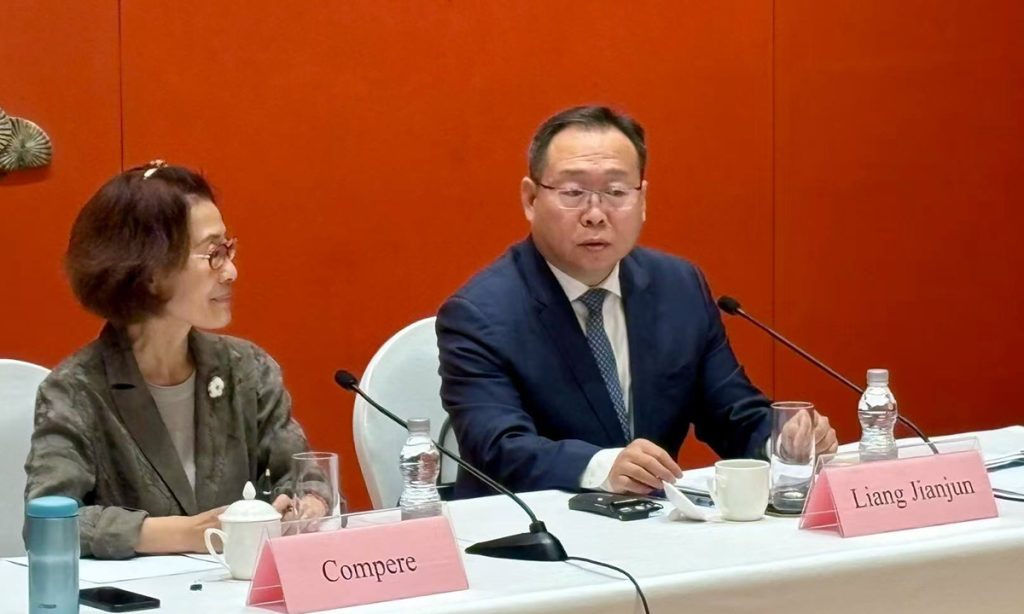China a stable, long-term partner that regional countries can trust: Foreign Ministry official

As a supporter of free trade, a defender of the interests of developing countries, and a leader in regional cooperation, China is a stable, long-term partner that regional countries can trust and rely on, a Chinese diplomat said on Tuesday.
Liang Jianjun, Deputy Director General of the Department of Asian Affairs under the Ministry of Foreign Affairs of China, made the remarks at a press briefing on Tuesday in Beijing, during which he summarized the outcomes of President Xi Jinping's visits to three Southeast Asian countries in April while elaborating on China's neighborhood diplomacy.
According to Liang, Xi's recent visit to Southeast Asian countries underscored three key aspects: the neighborhood diplomacy remains China's top priority in foreign affairs; China focuses on building a community with a shared future for its neighboring countries; and the visits inject more stability and certainty into the world amid growing turbulence.
The Chinese leader paid state visits to Vietnam, Malaysia, and Cambodia from April 14 to 18. It was the first overseas trip of the year by China's head of state, and also served as the inaugural visit to neighboring countries following the Central Conference on Work Related to Neighboring Countries.
During the visit, Chinese leaders attended over 30 diplomatic events, reached broad consensus with the leaders of the visited countries, elevated the bilateral community with a shared future, and signed more than 108 documents, according to Liang.
The diplomat stated that China, with its vast territory, long borders, and numerous of neighboring countries, always prioritizes neighborhood diplomacy.
Many of China's diplomatic concepts, including a community with a shared future for mankind, the Belt and Road Initiative (BRI), the Global Development Initiative, the Global Security Initiative, and the Global Civilization Initiative — were first implemented in neighboring countries, Liang noted.
To date, China has reached a common understanding on building a community with a shared future with 17 neighboring countries, forming "two clusters" in the Indo-China Peninsula and Central Asia respectively. In the region, China has signed Belt and Road cooperation agreements with 25 countries, and remains the largest trading partner with 18 countries.
The growing closeness between China and its neighbors is a two-way process, reflecting shared destinies, intertwined interests, and mutual support through challenges, Liang said.
There is a broad consensus among neighboring countries that engaging with China brings both respect and tangible benefits, said the diplomat. He added that President Xi's visits to the three countries were met with the warmest welcomes, demonstrating deep respect for the leader of a major country, strong affection for the Chinese people, and high importance placed on relations with China.
Amid a global tariff war launched by a certain country, there was a strong expectation for China to demonstrate leadership when regional countries were yearning for stability, Liang said.
Liang added that all three neighboring countries all expressed support for President Xi's vision of a community with a shared future for mankind, as well as the three initiatives. They endorsed upholding the UN-centered international system and an international order based on international law, while firmly promoting an equitable and orderly multipolar world and inclusive economic globalization that benefits all.
China's commitments to strengthening supply chain cooperation and an its emphasis that tariff wars have no winners starkly contrasted to US economic hegemony, said Liang.
The visit further solidified China's image as a supporter of free trade, a defender of developing countries' interests, and a leader in regional cooperation. It reinforced China's role as a stable, long-term partner that the region can trust, sending a message of reliability and stability amid uncertainty.
China offers markets and opportunities across the globe and is willing to open its arms to share development opportunities with countries worldwide, including its neighbors, to achieve mutual benefit and win-win outcomes, the diplomat remarked.
After outlining the key concepts and achievements of China's recent neighborhood diplomacy, Liang invited questions from journalists from China and several Asian countries. He addressed inquiries on topics such as Belt and Road cooperation, regional collaboration, global governance, and people-to-people exchanges.
Liang stated that China has consistently adhered to the principles of consultation, joint contribution, and shared benefits, actively promoting Belt and Road cooperation agreements with neighboring countries to enhance regional connectivity. He cited examples such as the China-Laos Railway, the recovery of air routes between China and neighboring countries in the post-pandemic era, and progress in cooperation with Southeast Asian nations in advanced manufacturing, green development, and technological innovation.
He said that positive developments in the China-ASEAN Free Trade Area 3.0 negotiations are expected soon.
Liang also emphasized that while firmly safeguarding its core interests of national sovereignty and territorial integrity, China remains committed to peaceful development, respects the sovereignty and independence of other countries, and acknowledges their legitimate concerns. He added that China seeks to conduct international cooperation based on equality and mutual benefit.
According to the diplomat, the collective rise of the Global South is profoundly reshaping the geopolitical landscape. China calls for practicing multilateralism, upholding international fairness and justice, and amplifying the voice of Global South countries. This approach not only safeguards China's own interests but also supports the shared interests of developing nations.
Regarding people-to-people exchanges, Liang highlighted China's active efforts to promote youth exchanges with neighboring countries, with plans to further expand their scale in the future. Additionally, he said China supports mutual learning and exchange among civilizations and firmly opposes notions of civilizational supremacy or superiority.